On A Trail of the Lost Languages
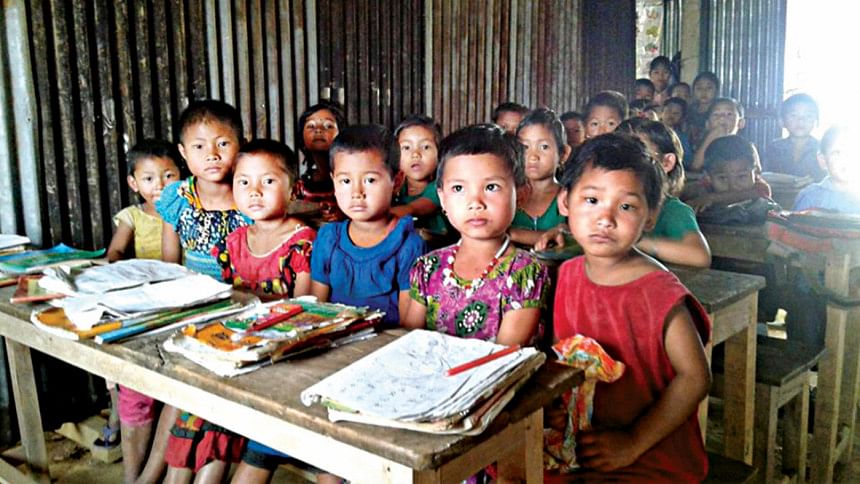
Photos: courtesy
The Chittagong Hill Tracts (CHT) includes some of the most inaccessible and remotest areas of Bangladesh. There are places surrounded by thick mountainous rain forests and steep ravines and valleys where no vehicles can reach. And, many parts of these hilly districts are tumultuous due to frequent riots between Bengalis and members of indigenous communities. So, when Rubayet Hossain, computer hardware and social media expert by trade and a cyclist by passion, reveals his plans to explore the three districts of CHT only by bicycle, many of his acquaintances laughed at him. However, a determined Rubayet who has travelled 918.4 kilometres from Tetulia to Teknaf, which is from the northern most tip of Bangladesh to the country's southern edge on his bicycle, had no intention to back out from his new mission.
Rubayet had travelled the entire country to raise awareness of the significance of blood donation. This time, with Dholok Communication & Media Limited as the tour organiser and The Daily Star as the media partner, Rubayet sets off to explore three sub-alpine areas of Bangladesh-- Rangamati, Bandarban and Khagrachhari – to discover how the indigenous communities of these areas have been practicing their mother tongue and their rich traditional culture for centuries.
"There are many different ethnic communities living in the three districts of the Chittagong Hill Tracts. They have their own mother tongue and rich folk culture influenced by the serene mountainous environment," says Rubayet.
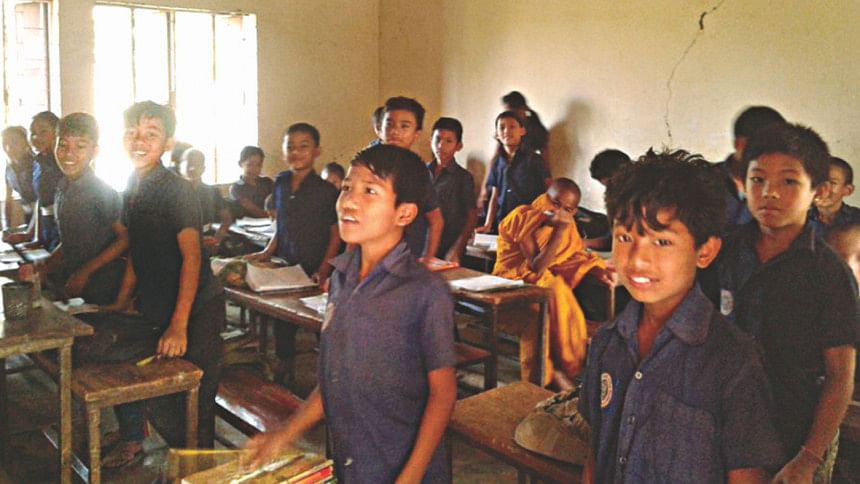
"However, it is evident that sustained intrusion by the Bengali settlers, missionary activities and dominant Bengali culture has threatened the existence of many unique features of their customs and mores, especially their mother tongues. My mission is to find out how these people have been coping with these harsh realities," he adds.
Rubayet's epic cycle ride began on February 17, 2016. Starting with his mountain bike as early as 5 am from Baroirhaat of Feni district, Rubayet reaches Ramgorh of Khagrachhari after 6 hours of cycling, with only one stop for breakfast. From Ramgorh, Rubayet starts to ride along the treacherous mountain passes that take him to the deepest part of the hilly areas. Rubayet says, "More and more settlements of Bengali settlers and the expansion of tourist spots have made the indigenous communities retreat to the more remote parts of the districts. To discover their villages, I have to ride through some of the roads that are so steep that it is impossible paddle!"
"So I get off my bike and walk uphill to reach a village called Karbaripara," adds an exhausted Rubayet. It is a village of the Tripura indigenous community situated in a place adjacent to the Indo-Bangladesh border. There is also a village of the Marma community nearby. In between the villages, there is a primary school where Rubayet visits to explore how the students, who are mostly from Marma and Tripura communities, are taught about their culture and norms.
However, the scene is quite disappointing. Although there is a clear statement in the National Education Policy 2010, that primary education has to be provided in the student's mother language, the reality is the exact opposite. The students are seen sitting in the classroom with torn, worn out Bengali books. Leon Adhikary the only teacher of the school says to Rubayet, "Our medium of instruction is Bengali. We find it very difficult to teach the students Bengali language as all of them speak in their mother tongue at home."
"So much of our effort has to be spent to teach them a whole new language from scratch," adds Leon. This resulted in the drop out of many students even before they can complete their primary education. "I have seen students drop out from school as early as class 1 and class 2. There is not a single school in all the three districts which teach about the language and culture of their communities in a sustainable way," says Rubayet.
However, as Rubayet moves deeper into the Khagrachhari, Bandarban and Rangamati districts, the villages surrounded by cloud covered mountains, forests and steep ravines brings him in contact with some of the most neglected and isolated communities. The Khumis, Marmas, Murong, Boms, Tonchongas, Tripuras, Chakmas have been living side by side for centuries and sharing these mountains and forests peacefully with each other. Khio Pru La, a Marma village elder says to Rubayet, "We did not know about land boundary. We had no idea of property ownership and division of land. We and our forefathers used to worship these mountains and gather our sustenance from these gods."
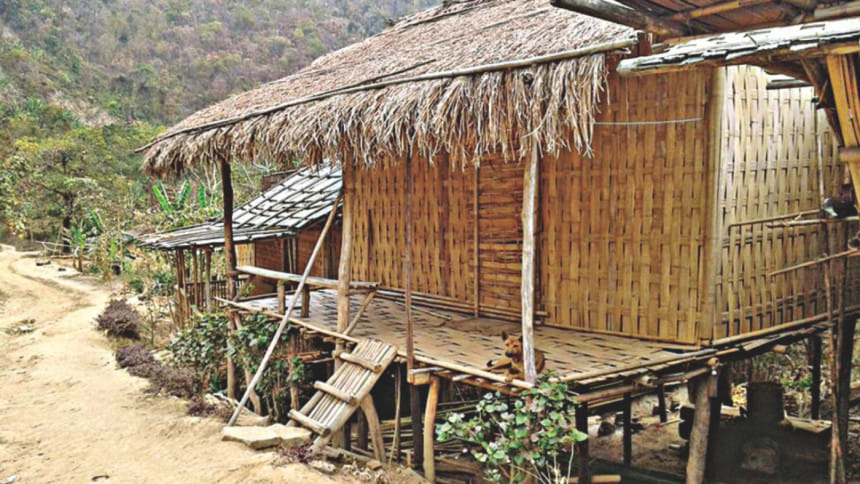
"One day, the Bengali settlers moved in and told us that this is your land and this is our land. From that day peace demised and we left our land to find shelter into the heart of our mountain gods," he explains. Although all of these communities have diverse and rich cultural heritages, most of these people have forgotten their traditions and history as many of them have no written historical records and literature. Even some of the communities like Bom have no written script and people of Chakma and Marma communities who have written scripts hardly use their mother tongue for writing.
"I found no document written in any of the indigenous scripts in any of the districts. A village headman called Horikishor Chakma gave me an address where I could find a written script but it was a two-day long journey even from one of the remotest parts of Bandarban district," says Rubayet. However, there are some NGO run and missionary schools who teach the indigenous students on their own language, but unfortunately their teaching has not proven to be effective and sustainable. "Some schools have been teaching indigenous language using Roman alphabet and some schools teach the language as long as they have funds. When they don't get enough fund, they stop the programme and shut their schools down," comments Rubayet.
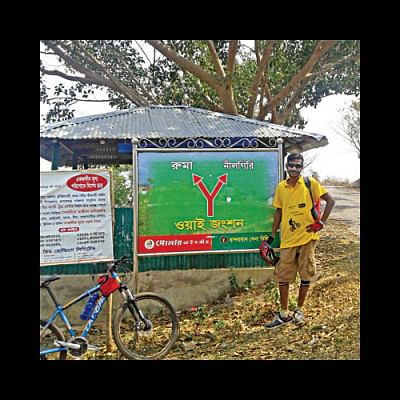
"Even parents of these students are not that interested in educating them in their mother tongue as they have realised the economic importance of Bengali in Bangladesh." he adds.
Poor accessibility, poverty and tension between insurgents and government forces are also some of the major reasons behind this sorry state of development. While Rubayet was on his way to one of the villages, he was picked up by five armed insurgents. After hours of interrogation, when they got proof of this youngster's noble intentions, they released him without doing any harm. However, many people are not that lucky. A few months earlier, three unfortunate tourists were kidnapped by the insurgents and were released only after paying a large ransom.
Rubayet's epic week-long cycling journey through the hill tracts ends after reaching the peak of Keokradong, one of the highest peaks of Bangladesh. However, his journey reveals one of the most tragic ironies in the history of Bangladesh. It has revealed that hundreds and thousands of citizens of Bangladesh have been losing their cultural and linguistic identity only because of the fact that they have been outnumbered by the Bengalis. Ironically these Bengalis of Bangladesh had shown the world how to preserve the existence and dignity of the mother tongue in the wake of cultural and political authoritarianism. If Bangladeshis truly respect the spirit of this great movement, it is their duty to come forward and help preserve the language and culture of these indigenous communities by giving them proper respect and recognition.

 For all latest news, follow The Daily Star's Google News channel.
For all latest news, follow The Daily Star's Google News channel. 


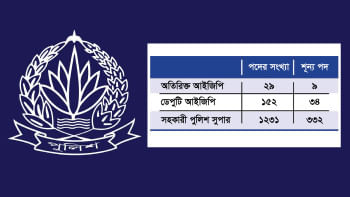
Comments